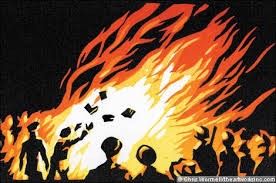Focus Questions:
Will the future be marked by further progress, material and intellectual, or by decline? Why?
Is it inevitable that current social and power structures will be the form of future social organisations?
How, and to what extent, will advanced technologies affect the lives of ordinary people?
What the text suggests:
The text suggests that intellect is no longer admired. It is seen no longer as a good thing to be intellectual but as a threat. It also suggests that everything is judged based on image and not content or substance. We can already see this happening on a smaller scale today in places like the music and fashion industry. People are being judged on how they look and not on how well they sing or how good of a person they are. This text is in a way our world on a extreme level.
It also suggests that technology and the media is more important than family, or anything else.
How the text presents these ideas:
When discussing a recent election Mildred and her friends talk about the opposition candidate. “What possessed the Outs to run him? You just don’t go running a little short man like that against a tall man. Besides – he mumbled. Half the time I couldn’t hear a word he said. And the words I did hear I didn’t understand.”
This demonstrates that people are judging a book by its cover, so to speak. That decisions are made about political leaders based on their appearances rather than what they have to say.
Once Montag has read the books to Mildred and her friends Mrs Phelps gets upset and this makes Montag question whether his curiosity is worthwhile. “It shocked me to see Mrs. Phelps cry. Maybe they’re right, maybe it’s best not to face things, to run have fun. I don’t know. I feel guilty –“
Montag is listening to Mildred and her friends talk about children. “I plunk them in school nine days out of ten. I put up with them when they come home three days a month; it’s not bad at all. You heave them into the ‘parlor’ and turn the switch. It’s like washing clothes: stuff laundry in and slam the lid.” Mrs. Bowles is the only one of them to have children, the other two are almost repulsed at the thought but Mrs. Bowles acts as if they are nothing but a household chore. She plays it off like they are the easiest thing to look after and this shows how people don’t even care about family anymore. They are all too caught up in their own little bubbles of technology to care about anything else.
